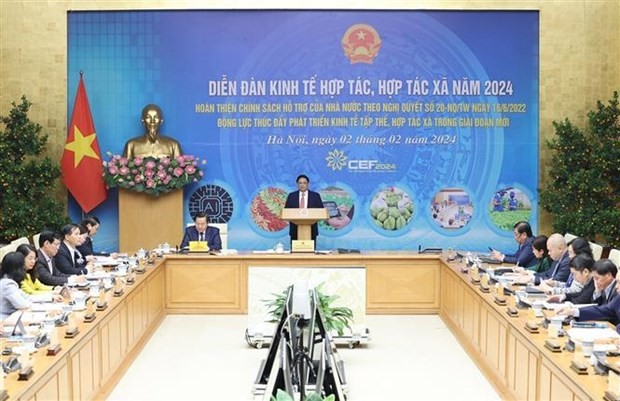
PM Pham Minh Chinh chairs Forum on Cooperative Economy 2024
Latest
 |
| The 2024 forum on the cooperative economy and cooperatives takes place in Hanoi on February 2. (Source: VNA) |
This year’s annual Forum of the Government, connected with all the 63 provinces and cities via teleconference, focused on the perfection of the State’s support policies for the collective economy and cooperatives in line with the Party Central Committee’s Resolution No. 20-/NQ/TW, dated June 16, 2022.
Prime Minister Chinh noted that the collective economy is one of the four important economic components of the socialist-oriented market economy of Vietnam. Over the past years, the Party, State, Government, all-level authorities, sectors, and localities have carried out many mechanisms and policies to facilitate the collective economy and cooperatives.
At present, he said, the collective economy has basically addressed its prolonged weaknesses. Cooperatives have basically completed the transformation to a new-style model. Cooperatives and unions of cooperatives have increased considerably and become more diverse in terms of industries, scales, and levels. They have better assisted their members, created more jobs, and further improved workers’ income. The connectivity among cooperatives and their connectivity with businesses and other economic components have begun developing.
Last year, there were more than 31,700 cooperatives, 158 cooperatives’ unions, and 73,000 cooperative groups nationwide. Each cooperative earned nearly 3.6 billion VND (147,900 USD) in revenue and 366 million in profit on average in 2022, respectively rising 35% and 71% year on year. Per capita income of workers of cooperatives averaged 56 million VND in 2022, according to the Ministry of Planning and Investment.
The collective economy and cooperatives have contributed to economic growth directly and indirectly – through impacts on their members, Prime Minister Chinh said, citing data of the General Statistics Office as showing that they have contributed to nearly 4% of the country's GDP. In many localities like Thai Nguyen, Lam Dong, Dak Lak, Dong Thap, An Giang, and Ca Mau, cooperatives have played a crucial role in the formation of large-scaled cash crop production zones to serve processing and export.
However, the Government leader also pointed out that their development has yet to catch up with their potential, meet requirements, or match the attention, policies, and expectations of the Party and State.
For the time ahead, the collective economy and cooperatives need to work proactively to escape from persistent weaknesses and obstacles to move forwards; strongly change both mindset and action to apply scientific - technological advances, conduct green transition, and boost digital transformation; develop the quantity and quality of members and the workforce; and improve the capital use efficiency, labour productivity, and connectivity under supply chains, he demanded.
He said Resolution No. 20-NQ/TW targets that there will be 45,000 cooperatives with 8 million members, 340 cooperatives’ unions with 1,700 member cooperatives by 2030, with over 60% of entities of the collective economy operating effectively, including at least 50% involved in value chains. It also aims at over 90% of those entities operating effectively, including at least 75% involved in value chains, by 2045.
Requesting both quantitative and qualitative development of the collective economy, Prime Minister Chinh said it is necessary to issue priority policies for the entities working in agriculture, link their production and business activities with value chains, help them apply science - technology, boost innovation and digital transformation, and connect their development with the development of green economy, circular economy, and knowledge-based economy.
As Vietnam is building an independent and self-reliant economy that extensively, practically, and effectively integrates into the world, the collective economy and cooperatives must also stay self-reliant and resilient, enhancing the connectivity among members as well as between the collective economy and other economic sectors, and expand cooperation with international partners, he said.
The Prime Minister affirmed that the Government always encourages and provides the best possible conditions in line with laws for the collective economy and cooperatives to develop fast, sustainably, inclusively, and comprehensively so as to contribute to national socio-economic development.

























